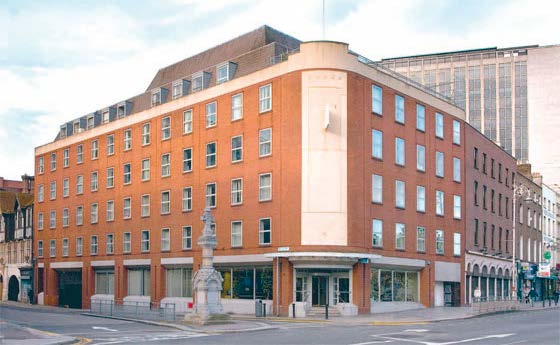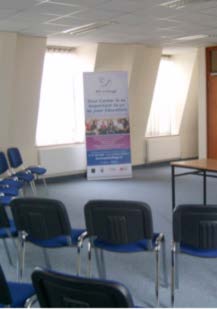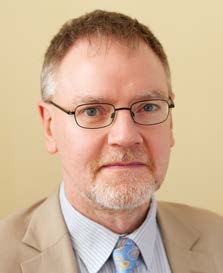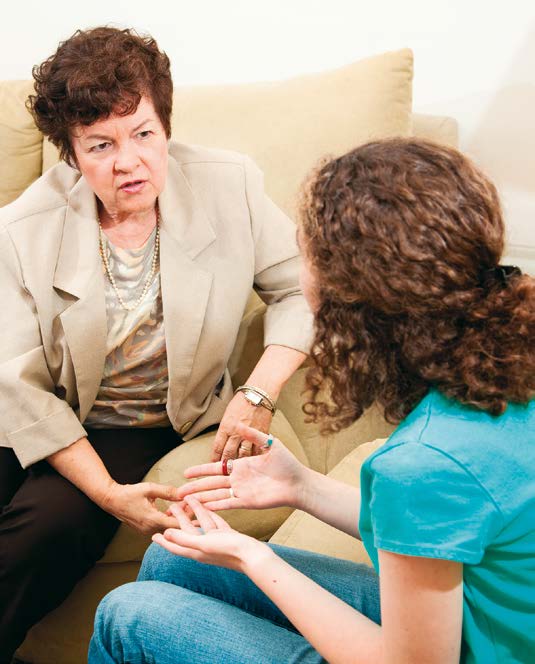Pcicollege.co.uk

W I N T E R 2 0 1 3
Alumni Journal
INSIDE THIS ISSUE
"Progress by Degrees - The Future of Counselling/Psychotherapy
as a Graduate Profession" by Eoin Stephens
Dr. William Glasser 1925 - 2013 Psychiatrist and Author
Positive Psychotherapy
Book Review: Understanding and Treating Sex Addiction:
Lecturer Profile: Jade Mullen
VOLUME 12, ISSUE 1


Welcome to the
Winter 2013 edition of
I would like to take this opportunity to discuss with you a
Psychotherapy! Some of you may have even noticed that
number of highlights and developments within PCI College
there has been a move to deliver counselling session through
and the world of Counselling and Psychotherapy.
Skype and other video applications. In fact PCI College ran a very successful workshop earlier this year entitled "Learning
As you may have seen over the last year and since our
to Offer Counselling Online" taught by the College President
last edition, there have been significant changes within PCI
Mr Eoin Stephens, which covered that very subject.
College especially within the area of technology. Changes have been afoot with the introduction of a new Student
Going back to the Student Portal I would like to describe
Portal to simplify access to documentation and create a
the composition of this development including key areas for
PCI College online community.
students to avail of. The first is the Courses pages, where key module materials are held, access to the courses timetable
This area is also supported with PCI College Facebook,
and a forum to allow students to connect outside of the class
Linkedin and Twitter accounts. The age of social media and
room is available. Followed by a Resources area, where useful
technology has arrived into the world of Counselling and
information is stored with access to the online myilibrary

and EBSCO Journals. In addition to this is a new exciting development ‘esubmissions' where all essays are submitted electronically with direct feedback and results sent to the students email account. Therefore there will be no waiting for information in the post and wondering if it has been lost or delayed. To complement this service this is a particular area which should be of great interest to the student body where each student is provided with their own SkyDrive; an area to keep documentation and assignments stored in the cloud. This will greatly assist students with the ability to access their work from anywhere within the world and they can be sure it won't be lost by PC/Laptop issues or data keys going missing. As part of the Portal development students are now provided with a PCI College email address allowing clear communication and no loss of messages which may have disappeared into junk folders in the past. All in all these areas of information sharing and storage should be complimentary to the learning and development in class and assist with growth and development of the whole College including the student body.
As the world is changing, technology is becoming prevalent in everyone's life, welcome or not. It is important to remember that the world always grows and develops and one should not be left behind. Embrace these IT developments, take the challenge and see what journey it leads you on.
With the topic of change and challenges at the forefront of my
Education is key to improving oneself and assisting others. By
mind it is interesting to see the IACP's proposal recommending
evolving and improving our knowledge through education and
that Counselling and Psychotherapy training moves to a
growth in new developing areas we can be sure that we are
minimum of Level 8 Degree qualification for accreditation.
providing the best knowledge we have to students, which they
Although this may take a few years to be implemented it
can use when working with and supporting clients.
is clear that education within the world of Counselling and Psychotherapy is extremely important. PCI College have for
It's a journey it may be hard, but embrace the changes, don't
many years been leading the way in supporting this move to
be afraid and enjoy the knowledge that you gain.
ensure clients have accredited and well trained Counsellors.
Education is key, where would we be without it!
Integrity within this sector is highly important and it is key to ensure that the profession is regulated and that minimum educational standards are adhered to. Would you visit a Doctor who is not fully trained? Can you stand by your training if it is not reaching minimum recommended standards?
PCI College are delighted to see this recommendation from the IACP and we hope that this proposal will be implemented

Progress by Degrees –
The Future of Counselling/
Psychotherapy as a Graduate
Profession
College President
By Eoin Stephens
Introduction
Counselling/Psychotherapy has been gradually moving, in Ireland
University and PCI College in 2001 to provide an Honours BSc
as in many other countries, towards an identity as a distinct
in Counselling & Psychotherapy, leading the way in typical Liam
profession. Not everybody supports this move, and indeed there
McCarthy fashion!
should still be a place for the use of counselling/therapeutic skills by a wide variety of other helping and educational professionals
There were of course many motivations for Liam in taking this
(nurses, teachers etc) within their own work contexts (what John
step. As I have said elsewhere (http://www.pcicollege.ie/
McLeod calls "Embedded Counselling" - see link below).
"Liam McCarthy was a man who believed passionately in personal development, and he knew that adult education could
But the role of the Counsellor/Psychotherapist is distinct
be a central element in that development for many people. One
from that of the Psychiatrist, the Clinical Psychologist and
of his visions was to open up third level education to a wider
the Social Worker, and we need to be able to take our place
pool of mature students who might not have otherwise seen
at the multidisciplinary table (literally, in the context of
themselves as getting a degree…"
case conferences).
But setting a new standard within the field was certainly one of the desired outcomes.
Most professions require a university degree as a basis for entry (along with a period of internship or the equivalent). However,
Again, not everyone in the field is completely happy about the fit
this is still work in progress within the helping professions
between university education and Counselling/Psychotherapy
in Ireland; within the nursing profession the transition to a
training (I believe parallel discussions/concerns exist within
requirement for a Level 8 (Honours) Degree only took place in
the world of nurse education). Liz Ballinger, in her article
the early 2000's. (See link to the 1998 Report of the Commission
"Insecurity of Tenure" (Therapy Today, Vol. 24, Issue 1, February
on Nursing below)
2013) proposes that "There are areas of potential fit between
counsellor training and wider university cultures that suggest universities are appropriate settings for counselling training." But
PCI College, as a major provider of Counselling/Psychotherapy
she also looks at areas of concern expressed by those working in
training and education, strongly supports this movement
the sector. (See link below).
towards professionalization of our field, and has always had
higher education as part of this vision. This was reflected in the 2004 name change from Personal Counselling Institute
And, of course, one doesn't currently need a degree to practice
to PCI College, but it was always central to the vision of Liam
as a Counsellor/Psychotherapist (hence the 3-year Diploma
McCarthy, who founded PCI along with Josephine Murphy. It
within the 4-year PCI College degree, enabling students to begin
was Liam who set up the collaboration between Middlesex
working towards accreditation with the IACP). But there have

been some relevant recent developments which show that the
As I have mentioned elsewhere (http://www.pcicollege.ie/MA-
movement I am talking about here, while happening slowly, is
Integrative-Counselling), this document included the following
Baseline qualification and experience for registration as
In August of this year, Quality & Qualifications Ireland (a new
psychotherapist: Minimum four years of training in specific
statutory body incorporating what was formerly HETAC),
psychotherapy modality at master's level (1,400 hours)…
published Draft Awards Standards for Counselling and Psychotherapy (see link below).
Baseline qualification and experience for registration as
Counsellor: Minimum 4 years training in specific counselling and
psychotherapy modality Minimum 1250 hours…Leading to a degree or recognised accredited equivalent in
According to QQI, this document "presents working draft awards
standards for counselling and psychotherapy and is published for consultation purposes…"
This document seems to suggest that there is broad agreement
"The Awards Standards for educational and training qualifications
about the need for a minimum degree-level qualification for
in Counselling and Psychotherapy are designed to be used by
practitioners in the Counselling/Psychotherapy field. However,
persons developing and reviewing specific programmes of
it also seems to assume that there is some substantial and
education and training leading to major awards (at NFQ Levels 6
distinguishable difference between practising as a Counsellor
through 9 inclusively) in Counselling and Psychotherapy…"
and practising as a Psychotherapist, and that the former
"They provide a reference for benchmarking intended programme
should require a Bachelor's degree (Level 8 on the National
learning outcomes…"
Framework of Qualifications), with the latter requiring a
"The draft awards standards are standards for ‘intended
Master's degree (Level 9).
programme learning outcomes' rather than standards for assessing candidates for particular qualifications."
So, while QQI are proposing educational standards for the field of Counselling/Psychotherapy education (particularly for the programmes they validate, but this will inevitably influence standards within all similar programmes), they are not specifying at what point in a student's progression from Level 6 to Level 9 (Masters) the student would be deemed to have a professional qualification in the field. This decision they see as a matter for CORU, the Health & Social Care Professionals Council (www.
coru.ie), in discussion with the various accrediting bodies in the field (IACP, IAHIP, NAPCP etc).
However, they do make reference to a document produced by the Psychological Therapies Forum (a discussion forum for the main accrediting bodies) and presented to the then Minister for Health, John Moloney, in 2008 (see links below).

IACP Position Paper
In September of this year the IACP published a position paper on "Statutory Regulation and the Difference Between Counselling and Psychotherapy" (see link below)
In summary, the position paper clarifies the following (italics added):
1. IACP, as an Association, does not differentiate between
Counselling and Psychotherapy. 2. IACP, as an Association, sees no proficiency difference
between Counselling and Psychotherapy.
3. IACP recommends that Counselling and Psychotherapy
should be regulated, by the State, with the same baseline academic and practice qualifications.
4. Level 8 on the National Framework of Qualifications (NFQ)
should serve as the baseline academic qualification for both
Counselling and Psychotherapy.
5. There are other important considerations for the profession, as a whole, to work on relating to Statutory Regulation and
practitioners who work with people over a short or long term
the difference between Counselling and Psychotherapy.
to help them bring about effective change or enhance their wellbeing.
This position is supported by PCI College, and I have written a
letter to the Editorial Committee of Éisteach, the journal of the IACP, to state this support.
BACP also comment that:The proposal to differentiate between counselling and
While we fully support (as I am emphasising in this article) the
psychotherapy is out of step with research and other developments
need for degree qualification within our profession, we see no
in the field of the psychological therapies…
basis for introducing Postgraduate qualification at this stage
(usually reserved for specialisation and advancement within a
profession), nor for making the distinction between Counselling
and Psychotherapy in this way. We believe in treating "Counselling
& Psychotherapy" as one unitary area, as is widespread (though not universal) practice in the field.
And finally:
BACP's position has consistently been that there is no difference
The IACP Website describes the situation this way:
between counselling and psychotherapy. In terms of role,
Counselling and psychotherapy are terms that overlap heavily
value and effectiveness, we believe that each occupational
and are often used interchangeably. They incorporate the giving
area has equal value. Many of our members use these terms
of attention and respect in a confidential relationship.
interchangeably depending on the environment they are working in. Indeed, BACP's research committee which comprises
The BACP website offers this definition:
international scholars of counselling and psychotherapy were
Counselling and psychotherapy are umbrella terms that cover
unable to differentiate between the two on the basis of evidence.
a range of talking therapies. They are delivered by trained

Part of the difficulty here is that there is no widely agreed
Association for Counselling & Psychotherapy, Spring 2005, p. 8).
definition or even any consistent usage of the terms "Counselling"
In a similar vein, Colin Feltham and Ian Horton, in the Third
& "Psychotherapy". While the term "Psychotherapy" is used
Edition of their influential Sage Handbook of Counselling and
by some only in relation to the Psychodynamic family of
Psychotherapy (2012, p. 3), state that "No single, consensually
approaches, the fact that this is not the only well-established
agreed definition of either counselling or psychotherapy exists
usage can be seen in the names of such large and influential
in spite of many attempts across the decades in Britain, North
bodies as the British Association for Behavioural & Cognitive
America and elsewhere to arrive at one".
Psychotherapy and the Irish Association for Humanistic and Integrative Psychotherapy.
Certainly, the PCI College/Middlesex University BSc in Counselling & Psychotherapy programme is designed with a broad, eclectic
Marcella Finnerty (Director of the Institute of Integrative
and integrative view of Counselling and Psychotherapy in mind.
Counselling and Psychotherapy) points out that "The debate
We support and look forward to the consistency of qualification
about whether there are any notable differences between
standards that Statutory Regulation of our profession will bring,
psychotherapy and counselling has been ongoing for many
and believe that our students and graduates are in a good
decades and opinions differ, each side making justifiable claims
position to avail of this consistency when it finally comes.
for holding their particular viewpoint. Just as with the term counselling there is little unanimity in defining what is meant by the term psychotherapy" (Eisteach, the Journal of the Irish
Dr. William Glasser
1925 - 2013
Psychiatrist and Author
Institute Ireland
On the 23rd of August 2013 Dr. William Glasser, world-renowned
Dunne, and the interest in his work has flourished since then. Dr.
psychiatrist, author, and creator of both Reality Therapy and
Glasser's practical common sense approach in Reality Therapy
Choice Theory Psychology, passed away peacefully at the age of
had an instant appeal for guidance counsellors keen to improve
88. We join with many throughout the world who feel this loss
their professional skills, and he attributes his Irish colleagues
of such a pioneer in the field.
with the inspiration to rename his psychological approach, as "Choice Theory".
He had been in poor health for some time and died surrounded by his wife Carleen and family members in his Los Angeles
Dr. Glasser has always been very aware of the key role played by
home. Dr. Glasser and his first wife Naomi, who died in 1992,
a guidance counsellor not only in counselling but in co-ordinating
had three children, Joseph, Alice and Martin. In 1995 Dr. Glasser
a school-wide approach to counselling. The Institute of Guidance
married Carleen Floyd. He lived all of his professional life in
Counsellors conscious of his great contribution to their work
the Los Angeles area of California. His emphasis on personal
conferred an honorary fellowship on Dr. Glasser, something he
responsibility for mental health problems helped sell millions
treasured very much. Bill Glasser, the man, also appealed to us
of his books. He also advocated education reform. The Irish
with his relaxed personal style and had a generous appreciation
Guidance Counsellors have lost a great friend and mentor.
for an Irish joke. He enjoyed the Irish and we enjoyed him.
The Journey of Dr. Glasser
Dr. Terry Lynch's publication "Beyond Prozac" {2001} inspired Dr.
Born in Cleveland Ohio, USA, on 11th May 1925, Dr. Glasser
Glasser to write a book about the dangers of the biochemical
reached international fame in 1965 when his ground-breaking
analysis of human distress. Later Dr. Lynch was invited to write
book, "Reality Therapy", challenged the traditional beliefs of
the foreword to Dr. Glasser's own book; Warning: Psychiatry can
psychiatry at the time. As an increasing number of people
be Hazardous to your Mental Health {2003}. Dr. Glasser wrote a
wished to learn his methods and to help train people in his
total of 27 books as well as publishing many articles. A biography
approach he founded the "Institute for Reality Therapy" now
of Dr. Glasser by Jim Roy, "Champion of Choice" is due to be
called "William Glasser International" which was chaired by Irish
published in the autumn.
Guidance Counsellor, Brian Lennon.
Dr. Glasser believed that "everyone who needs psychiatric
Reality Therapy is a method of counselling which teaches people
treatment suffers from one basic inadequacy: he is unable to
how to direct their own lives, make more effective choices, and
fulfil his essential needs". He believed that whether a person
how to develop the strength to handle the stresses and problems
in mental distress exhibited psychotic behaviours, anxiety or
of life. The core of Reality Therapy is the idea that regardless of
depression, that person was in fact opting for the best possible
what has "happened" in our lives, or what we have done in the
solution available to him or her. He believed that, in general,
past, we can choose behaviours that will help us meet our needs
these people do not have anything wrong with their brains or
more effectively in the future.
brain chemistry but do need to learn new ways of coping with their situations. According to Dr. Glasser {2003} "these people
Dr. Glasser first came to Ireland in 1985 invited by the then
may be a product of the past, but not victims of it because they
President of the Institute of Guidance Counsellors, Arthur
have control of their present and future".
The Reality Therapy he developed enabled people with personal
went on to develop an approach, the Glasser Quality School
distress to operate in the present in a caring relationship offered
model, based on Choice Theory, where the emphasis is on
by the therapist and the main aim is to help the person find and
meeting students' needs in a non-controlling way.
learn new ways of dealing with life. Thanks to the influence of others such as William Powers and W. Edwards Deming, Dr.
Dr. Glasser claimed that poor relationships with students and
William Glasser developed a new psychological theory he was
a tolerance of inferior work made many schools unhappy and
to call "Choice Theory" and published this in 1998. A core tenet
unsuccessful places. Schools that adopt the Choice Theory
of Choice Theory Psychology is that we cannot control others,
approach experience changes towards a very high level of
only ourselves and most of our behaviours are chosen (though
academic achievement and a very low incidence of discipline
not necessarily consciously). Dr. Glasser believed that many
problems. An Irish authored book, "In The Driving Seat"
of the world's problems at personal, social and even political
Responsible Behaviour – The Key to Happy Relationships Sr. B
levels derive from an often unwitting reliance on what he called
Gaffney, A. Martin, Sr. C Sweeney M. Taaffe {2006} has provided
"external control psychology", the belief that we can control
a useful tool for schools interested in positive mental health
other people or that they can control us.
education. In Ireland Trim Youthreach in Co. Meath became a Glasser Quality School in 2009.
Such beliefs lead to a lot of human misery. Choice Theory Psychology provides a very good structure for helping people
Around the world over 84,000 people in at least sixty countries
learn about personal wellbeing and in the last decades of his life
have done basic training in Glasser's ideas and 12,000 have
it was this positive approach to mental health that dominated
completed full training. In Ireland over four and a half thousand
Dr. Glasser's talks and writing.
people have completed the basic training course. Over a thousand students have completed training in Reality Therapy /
Having started his professional life working with delinquent girls,
Choice Theory, and they include guidance counsellors, teachers
Dr. Glasser always kept a strong interest in both therapy and
and psychotherapist. Dr. Glasser sees the counsellor's role as one
education. In 1969 he published "Schools Without Failure" and
of helping the client learn the principles of Choice Theory in his or her own life and to focus on their "internal control rather than external control psychology".
Honours for Dr. William Glasser
Dr. Glasser's challenge in the sixties to the established ideas in the
field of counsellors and psychotherapy required a special brand of
courage from him but eventually he was recognised by his fellow
professionals. In 1989 the Milton Erickson Foundation's Evolution
of Psychotherapy Conference admitted him as a member of the
distinguished faculty of Pioneers in Psychology. In 2004 the
American Counselling Association awarded him their Legend in
Counselling Award, and in 2005, the American Psychotherapy
Association designated him as a Master Therapist. In May 2013
the California Senate passed a resolution to honour Dr. William
Glasser for "a lifetime of achievements and meritorious service
to humanity". It was so fitting this last honour should have been
in his home state and city. Reality Therapy has been named by
the European Psychotherapy Association as one of its recognised
therapies and training provided in Ireland can now lead to a
European Psychotherapy qualification.
My own journey with Dr. Glasser
The title of the conference is Choice Theory for Everyday Living.
Dr. Glasser came to Ireland in July of 2005 for the annual
Dr. William Glasser, was an inspiration to all, he shall be
Convention which also coincided with my Certification Week in
sorely missed.
UCD. Dr. Glasser was celebrating three extraordinary milestones both in his personal and professional life. He was celebrating his
Gisela Oates on behalf of the William Glasser Institute Ireland -
80th Birthday, he was celebrating 20 years of Reality Therapy /
Executive Committee Member.
Choice Theory being in Ireland and Carleen and Dr. Glasser were also celebrating their 10th Wedding Anniversary.
William Glasser International can be contacted through the Irish branch and for further information about The WGII Convention,
I had the opportunity to partake in a role play with Dr. Glasser
Reality Therapy, Choice Theory and the Glasser Quality School
during that special week in UCD, which were both an honour
see www.wgii.ie. A special tribute page for Dr. Glasser has been
and a privilege to be a part off. Dr. Glasser was gracious enough
opened at www.wglasserinternational.org.
to sign several of his books for the participants while they were completing their certification week. He patiently posed for the many photographs that followed this auspicious occasion, which
Gisela Oates
are now treasured possessions.
BSc {Hons} Counselling Psychotherapy; Diploma in
I have only met Dr. Glasser once but he will always remain in my
Addiction Studies; Cert in
Quality World.
Reality Therapy / Choice Theory; Prof Cert in CBT, WGII, MIAAAC / MACI, MIACP
At out WGII conference in October, we commemorated Dr. Grasser. Two quotes from the brochure are very appropriate at
Gisela works as a Faculty
Lecturer in PCI College and is involved in both lecturing
"External control is by far the greatest obstacle
modules across the three year Diploma programme
to mental health all over the world."
as well as administrative roles. She is also an Addiction Counsellor and Psychotherapist based in Co Kildare.
"Happiness is feeling good because you are choosing to behave in ways that keep you close, or get you
She has worked within the field of Mental Health for 20
closer, to the important people in your life." Dr. William Glasser.
years both with the NHS in the UK and the HSE in Ireland. In conjunction with the HSE and the Rathmines Pembroke
Today Dr. Glasser's ideas on therapy, education, management
Partnership, she was an advocate for Mental Health and facilitated a drop-in centre "The Gateway Project"
and personal wellbeing are taught throughout the world with
for six years.
international conferences held every two years.
Gisela is an Ambassador for the ‘See Change' campaign, and
The William Glasser Institute Ireland is hosting our annual Irish
is currently on the board of the William Glasser Institute
Convention on 19th October 2013 at the IMI, Sandyford, Dublin
Ireland Executive Committee.
16, where we shall be carrying on with Dr. Glasser's work. To
Gisela has a keen interest in the process of
share with the world everything he shared with us.
Intergenerational Healing and Family Constellation work.
This Conference is being held in loving and grateful
Gisela is the founder of ‘Serenity Counselling Training' and
commemoration of Dr. William Glasser, Psychiatrist, Teacher and
maintains a private practice in Newbridge.
Inspiration to us all.
By Jolanta Burke
Imagine there was a way to supplement your therapy with tools that can help your clients with depression feel better, sooner. Well, there is a way: Positive Psychology offers such tools.
Positive Psychology is a science of optimal human functioning (Seligman & Csikszentmihalyi, 2000). It examines what is good about people and creates interventions that help them flourish (Seligman, 2011). It was originally created to examine the aspects of our psyche that were usually ignored. In the 90s, 17 out of 18 studies focused on human deficits and what was wrong with us (Peterson, 2006). Only one study in 18 looked at what is right about us. While the deficit approach is useful to understand unhealthy human conditions, it is crucial to take a balanced view and consider the positive side to us.
The traditional and positive psychologists' approach are complimentary. We look at a human being from a different viewpoint. For example, when clients attempt suicide, traditional psychologists focus on what they lack in
adjusted clients further enhance their well-being. However,
comparison to mentally healthy and well-functioning people.
a few years into the research, a significant change happened.
They create and use interventions to ‘fix' them and help them
Martin Seligman, one of the founders of Positive Psychology,
feel ‘normal' again.
spent many years of his academic career studying learnt helplessness and depression. Having experienced it himself,
On the other hand, positive psychologists examine clients'
he and his team wondered what would happen if positive
character strengths and other psychological resources they
psychology interventions were introduced to people suffering
can use to recover from adversity. Rather than ask them to
from mild to severe depression. Would they be effective in
‘think positive', we help clients explain the negative event in a
reducing their depressive symptoms?
specific way that is based on the research around developing optimism (Seligman, 1998). We are also curious about the
The results surprised even the researchers. Compared to
small sample of people who, rather than PTSD, experienced
traditional approaches used in therapy, not only did the
post traumatic growth, as a result of their adversity. Therefore,
interventions help clients feel better, but the change happened
both approaches are necessary for us to see the whole person.
sooner (Seligman, Rashid, & Parks, 2006). It was not because
Ignoring one aspect of us creates imbalance in the way we
positive interventions have magical powers of transforming
view our clients.
people. Rather, they create a shift in their thinking and help clients experience more positive emotions. Following from
Originally, Positive Psychology research focused on helping
the initial research, a meta-analysis of positive psychology
already mentally healthy people flourish. Positive psychologists
interventions with over 4,000 participants found that positive
created over 100 interventions that would help their well-
exercises seemed particularly effective with people experiencing
higher levels of depression (Sin & Lyubomirsky, 2009).
Jolanta Burke is a Positive
Psychologist and a PhD re-
Positive psychology interventions are different to the traditional
searcher in Trinity College
ones. Consider the famous Pennebaker activity that is widely
Dublin. She is passionate
used in therapy. Over 20 years of research found that asking
about improving psycho-
clients to write about their deepest thoughts and feelings for
logical well-being in Ireland.
20 minutes over three or four consecutive days results in many
She delivered programmes
psychological benefits: mood enhancement (Pennebaker,
helping professionals apply positive psychology in their
1997), reduction of depressive symptoms (Esterling, L'Abate,
work. They included psycho-
Murray & Pennebaker, 1999) and increase in effective coping
therapists, coaches, guidance
behaviour (Spera, Buchfeind & Pennebaker, 1994). However,
counsellors, youth workers to
we also know that writing about negative events puts our
mention a few. She also published many articles about pos-
clients into short-term stress (Pennebaker & Uhlman, 1994).
itive psychology in Ireland and abroad, a book chapter and spoke at many conferences.
Therefore, Positive Psychologists wondered if they can reduce
it by asking them to write about positive experiences instead.
Jolanta graduated from DCU with a BA in Psychology, MSc
Rather than dwelling on how trauma affected them, they
in Education and Training Management, Post Grad Cert in
were encouraged to recall a traumatic event and describe
Positive Psychology at the University of East London and is
how their experience benefited them as a person and made
currently pursuing a PhD in Positive Psychology applied in
them more resilient (King & Miner, 2000). In another series of
Education at Trinity College Dublin. Since 2009 Jolanta has lectured in Positive Psychology in DCU and Trinity College
studies, they wrote about the best possible self in the future
Dublin. She created the first Positive Psychology at Work
when all they wished to come true, actually has (King, 2001).
programme in Europe which was accredited by the Institute
What the researchers found was that both negative and
of Commercial Management in the UK in 2011.
positive writing had the same long term effect of significantly reducing depressive symptoms. However, positive writing was considerably less upsetting and resulted in enhancing positive emotions noticeably sooner than negative writing.
Encouraged by the initial results, the researchers created a series of positive psychology interventions applied in therapy (Seligman, Rashid, & Parks, 2006). They were based on a 14-session programme which introduced activities enhancing clients' positive emotions, engagement and meaning. The results showed more reduction of depressive symptoms and significantly higher remission rates than traditional therapy or antidepressant medication. Can they supplement your therapy?
Positive psychology is a rapidly growing science providing evidence for Maslow's Humanistic theory. Recently, it is particularly flourishing in therapy with progressively more research showing strong evidence of its effectiveness not only with people suffering from depression but also schizophrenia and other mental disorders. What therapists find attractive about it is the science behind the interventions and their striking results. It may be a great supplement to whatever approach you use. Are you open to try them?
Book Review:
Understanding and Treating Sex Addiction:
A comprehensive guide for people who struggle with sex addiction and those who want to help them. Paula Hall 2012
"Sex addiction is a devastating condition that affects many millions of innocent people' (Hall 2012:191)
At a time when Sex Addiction & Pornography Addiction is
Hall breaks through common misconceptions about sexual
becoming increasingly recognised & accepted as an addictive
addiction and clearly illustrates the difference between it
behaviour, the publishing of Paula Hall's ‘Understanding
and other misinterpreted behaviours often associated with
and Treating Sex Addiction" has been much anticipated and
sexual addictions, such as hypersexuality & sexual offending.
could not have come at a better time. Paula Hall, a registered
She challenges popular terminology specific to addiction such
Psychotherapist specialising in the field of Sex Addiction,
as Co-addiction in an effort to more clearly illustrate the
and founder of The Hall Recovery Course, leaves the reader
complexity of sex as an addictive behaviour in comparison to
in no doubt, through clinical experience and valuable new
other addictive behaviours such as food, gambling and drugs.
research (the first of its kind in the UK & Ireland), that Sex Addiction is not only prevalent but a real & growing problem
Throughout the book the author explores and defines with
silently thriving in society. She also leaves us under no illusion
ease related areas such as human sexuality, sexual desire,
that those suffering are struggling with an array of complex
fantasy, sexual dysfunctions, paraphilias and issues specific
emotions and challenges. "In a nutshell, all addiction is used to
to the LGBTQ community, providing the reader with a strong
manage emotional pain' (Hall 2012:57).
overall view of areas which often coincide with or relate to sexual addictions. She builds a strong introduction to the
Both refreshing and encouraging, this book gives clear insights
neurochemistry of addiction as a contributing factor in the
into many aspects of sexual addiction, exploring trauma and
progression of addiction and identifies various addiction cycles
attachment induced addictions, assessment criteria, and
and theories of progression. She has divided the book into an
many other topics. Hall introduces new insightful theories
easy-to-reference chapter format and provides a good balance
such as the Six-Phase Cycle, which explores addictions which
of theory, research and clinical & personal experience. To my
remain ‘dormant'.
mind she introduces a fresh honest perspective on sexual
addiction and a sincerity that treatment and recovery, whilst
From a professional perspective ‘Understanding and Treating
challenging, is possible.
Sex Addiction' provides those in the therapeutic field with a strong understanding of sexual addiction and identifies what
Until now publications on sex addiction have been
to watch out for in clinical practice which may ordinarily be
predominantly based on US studies, and Hall draws on an
missed or unspoken. As Hall suggests "for many people it's too
array of research and mounting evidence from renowned
painful or risky to talk about their sexual acting out so instead
experts in the field of sexual addiction such as Patrick Carnes
they will seek help for the consequences without openly
& Robert Weiss. However, one of the key themes throughout
acknowledging the cause'. (Hall 2012:18)
‘Understanding & Treating Sex Addiction' is Hall's clinical research based on 350 people struggling with sexual addiction,
Orlagh Gahan is a Psychotherapist at The Centre for Sexual
some of who have gone through therapy. She provides first
Addictions, Dublin, Ireland. www.centresexualaddictions.com
hand accounts and case studies from those suffering from sexual addictions, and a rich insight into the psyche of the
She is a member of ATSAC, and a graduate of PCI College, where
sexual addict. Hall identifies how her research parallels and
she completed a Thesis titled: Sexual Addiction, Treatment &
compares on many levels to US based research and how this
Support Service in Ireland.
helps identify issues specific to the UK.
The author explores as a common theme the impact of an ‘unprecedented explosion of the internet and ever-growing availability of pornography' (Hall 2001:i) and identifies how this has contributed to an increase in those suffering from sexual addiction. She emphasises, in particular, the impact this explosion may be having on the younger generation. She identifies how the ‘availability' of Pornography and an array of sexual activity has given rise to an increased prevalence of ‘Opportunity Induced Addiction' and clarifies how treatment and recovery differs from Trauma or Attachment Induced Addiction.
Hall's open and articulate style of writing desensationalises and demystifies the issue of sexual addiction. She does so in an empathic & compassionate manner throughout the book, as she offers scenarios and associations which easily encourage the reader to relate on a personal level to rationalisations and other issues which arise as a result of sexually addictive behaviour and emotional distress.
With great emphasis on recovery, this book provides an overview of support & resources available to those seeking treatment & recovery in the UK and Ireland. As a Psychotherapist, I enthusiastically encourage and recommend this book to those who want to understand more about Sex Addiction or begin recovery, and indeed to anyone interested in gaining a good understanding of addictive behaviour overall, as it easily and cleverly flows into other areas of addiction in order to help the reader gain a more rounded understanding.
I recall approaching the end of my school education and feeling
difficult to work on started to circulate. I remember telling my
daunted about having to choose my next step (although perhaps
family, who were quite concerned about this new venture I had
it was my first step) in life. ‘What are you going to be?' That is
embarked on, "It is all going great so far and I will be grand as
the question that was thrown around at the time. I felt that I was
long they don't put me on ‘St. Mary's' ward". Three weeks later,
the only one of my peers that had no clue what I was going to
quite nervous and a little green, to say the least, I began my first
‘be'. When all of my friends seemed so sure that they were going
shift on St. Mary's Ward.
to become hairdressers or teachers or nurses, I was at a loss. The one thing I was sure of was that I wanted to work with people. As
The experience I got working in Broadmoor was invaluable. It
I began to tease this out, I realised that my desire was more than
taught me many things about the human psyche and behaviour.
just working with people, I wanted to understand people, who
I began to understand the complicated relationship we have
they were, why they were and what their lives were all about. It
with our biopsychosocial world and I received huge insight into
was on this notion that I embarked into the world of Psychology,
this extreme world of mental health. I also had a chance to
completely unaware as to where this journey would take me.
partake in a research project and was involved with behaviour observation and data collection. In addition to all of this, I
I began an undergraduate honours degree in Psychology with
learned a great deal about myself – my shadow side, my biases,
DBS, where I became immersed in the world of psychology and
my resilience. This experience left me curious and I knew for
psychoanalysis. These three years studying left me wanting
sure that I needed to study further in this area.
more and I began to think about what the next phase could bring. I briefly flirted with the idea of delving further into
I returned to Ireland and promptly headed to Cork to begin a
psychoanalysis, having been offered a place on a Master's in
Master's in Counselling Psychology with UCC. Again, I had
Psychoanalytic Psychotherapy, but I decided against this and
begun another eye-opening and life shaping journey. I was
instead, naively, jumped head first into the world of extreme
fortunate to be mentored by Professor Eleanor O' Leary, who
mental health.
had worked with and was a great friend of Carl Roger's, in an environment which was both nurturing and challenging all at
I accepted a job offer in Broadmoor Hospital in London and
once, with personal process around every corner. As there were
within a week I had packed my bags and uprooted. Broadmoor
only 3 other students in my class, there was certainly no room
Hospital is one of the three high-security, psychiatric hospitals
to hide so I really do mean it when I tell my students that I
in England which treats people with mental illness and
understand the ‘pain' of the word dyad!
personality disorders who represent a high degree of risk to themselves or to others. Prior to beginning work with the
Having been away from ‘home' for quite some time now, I was
patients, I underwent intensive training to learn how to keep
eager to return to Dublin upon completing my Master's. One of
myself, other staff members and the patients safe while working
the most interesting areas I have worked in since returning to
within the hospital. As the wait to begin working directly with
Dublin has been in a special needs school where I worked with
the patients was prolonged, the apprehension began to build
children who have a diagnosis of autism. I was based within the
and lots of stories about infamous patients (some of whom you
school setting teaching and supporting children from pre-school
would no doubt be familiar with) and which wards were more
age up 18 years, through the methods of Applied Behaviour
Analysis and Positive Behaviour Support. This work has led me to develop a keen interest in autism, particularly in relation to
Spring CPD Programme
psychotherapeutic supports, knowledge and psychoeducation
We have an exciting array
for parents and carers of children with autism.
of courses to choose from
In addition to this work, I began to develop a relationship with
BOOK EARLY TO AVOID DISAPPOINTMENT
PCI College through lecturing on the degree in Counselling and Psychotherapy course on a part-time basis. In June 2013, I came
Professional Certificate in CBT
on board as a full-time faculty member and joined the team as
Advanced Certificate in CBT
Professional Certificate in Couples Counselling
Year Head for Years 3 and 4. It has been wonderful to experience
Professional Certificate in Sexual Addiction
PCI College from this new role as it enables me to have more
Compassion Focused Therapy
hands on contact with the students. I am currently in the process
Masterclass in Psychology for Counsellors
of visiting the Year 3 classes around Ireland and it is great to be
Creative Intervention Workshops
able to meet and talk to so many students face to face.
Body Work & Self Care Workshops
All the while my professional life has been unfolding, so too has my ‘other' life behind the scenes. My family, who were rightly concerned in the early days and whom I so greatly missed while I was out of Dublin, are the escape valve for me and have kept me grounded throughout all of the above. I have recently come
Counselling & Psychotherapy • Psychology • Professional & Personal Development
into a new role here also, that of a mother, and knowing what I
Save the Date: Saturday June 28th
know about family systems, lifespan development, attachment
2014 National Counselling & Psychotherapy Conference
and Freud, I have a feeling that this is the role that will be my
"The Art & Science of Self-Care"
most challenging yet!
01 4642268 • [email protected] • www.pcicollege.ie
PCI College is delighted to announce that Willie Egan, Donagh Ward, Pat Gavin and Gael Kilduff have joined the Regional Faculty team. They have previously lectured on a number of modules with the college and are a welcome addition to the PCI Faculty in Cork, Kilkenny & Athlone.
Jade Mullen joined PCI College in June 2013 as a full time Faculty Lecturer. She currently lectures on all years of the BSc in Counselling and Psychotherapy and on the Certificate course. Jade is the Year Head for Years 3 and 4 and Core Tutor for a number of groups within Years 2 and 3. She is also the thesis co-ordinator and an active member of the PCI College Research Committee.
We have also had a number of well-deserved promotions within the administrative team, who provide important back-up and support for our lecturers and those studying with us. Rhiannon Murphy now holds the position of College Director; Debbie Brennan now holds the position of Student Services Manager; Sinead Delaney now holds the position of Senior Executive Officer, Programmes Office; and Lynn Hanley now holds the positions of Junior Marketing Officer. We also have two new additions to the team, Brian O'Murchu, College Receptionist and Sinead Ni Mhaille as Executive Marketing Officer.
Congratulations to all of them. We wish them the best in their new roles. If you have any news you would like to highlight in this section of Reflections please email [email protected]
Congratulations to all the PCI College Graduates
who gained their IACP Accreditation this year.
Margaret Tierney-Smith
Blanaid McDonnell
Evelyn Hainsworth
Geoffrey McCarthy
Josephine Mullarkey
Rosemarie Masterson
Caroline Corcoran
FOR MORE I N FORMATION
about our programmes, courses, free lectures, workshops and events
please call 01 464 2268 or email us at [email protected]
Information can also be found on our website, www.pcicollege.ie
Source: http://www.pcicollege.co.uk/files/UserFiles/PCI%20College%20Reflections%20Winter%202013.pdf
HBV treatment and pregnancy Jörg Petersen⇑ Liver Unit, IFI Institute for Interdisciplinary Medicine, Asklepios Klinik St. Georg Hamburg, Germany See Article, pages MS The management of hepatitis B virus (HBV) infection in preg- often results in clinical remission This scenario is in contrast nancy is complex. Because infection with HBV in infancy often to the oral antiviral agents that generally require long-term ther-
REVERSE PAYMENT PATENT SETTLEMENTS IN THE EUROPEAN UNION AND THE UNITED STATES Damien Geradin George Mason University School of Law Douglas Ginsburg George Mason University School of Law Graham Safty University of Chicago Law School George Mason University








